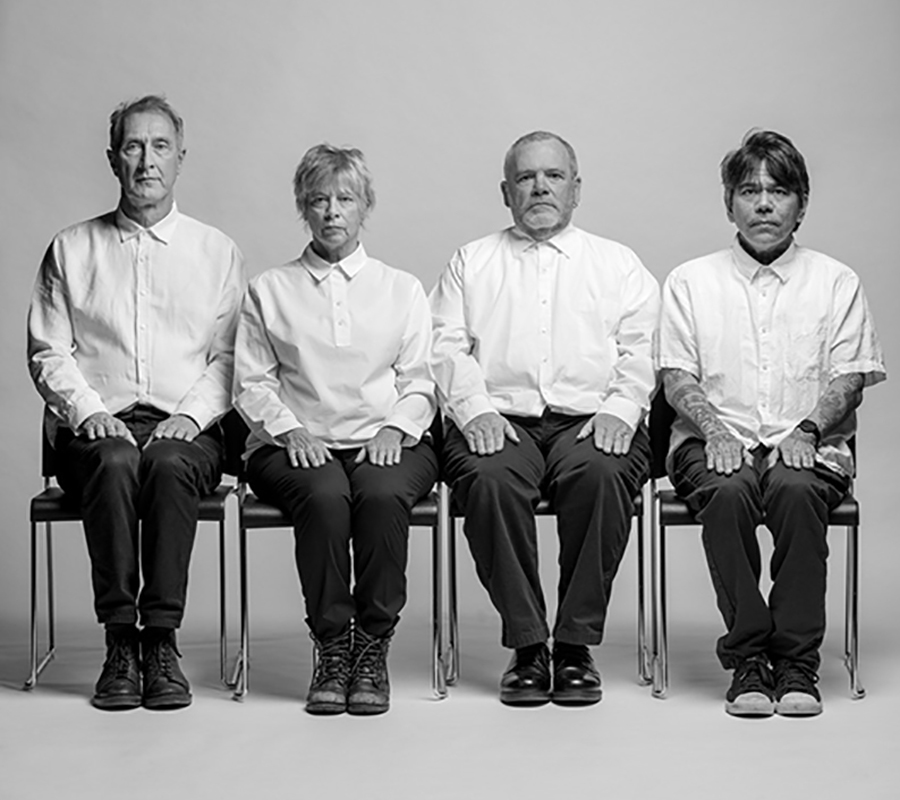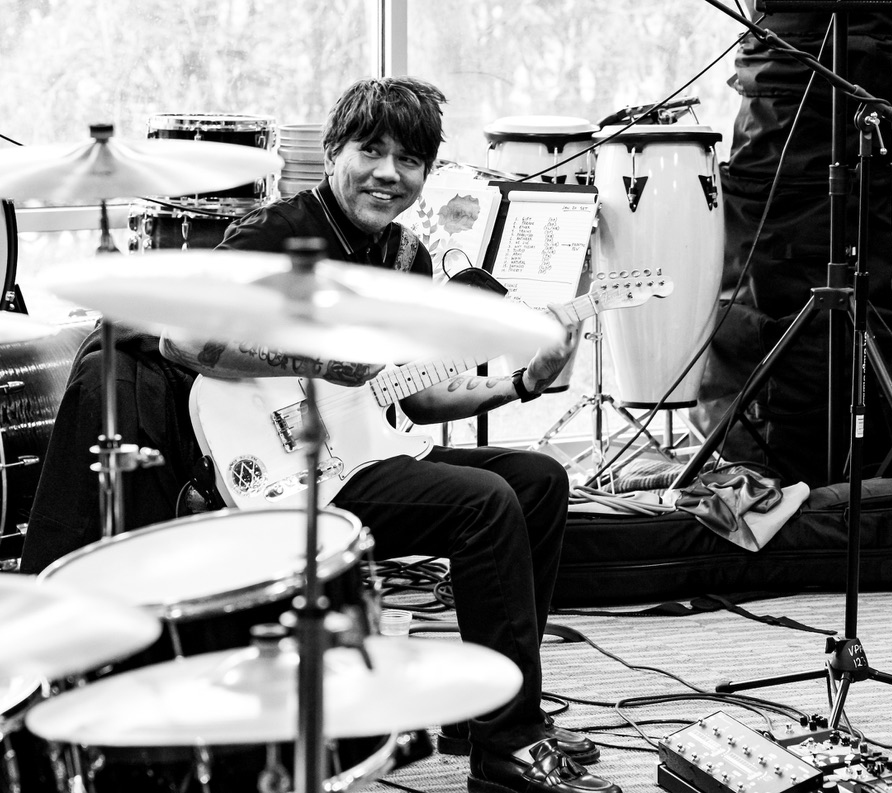Gang of Four have aged well. That’s because of the band’s music — clattering, sometimes funky, ahead-of-its-time art-punk that has never stopped being a frame of reference for contemporary bands in both the U.K. and America. But it’s also because their work served as a political critique — not so much “protest songs” à la Woodstock, but rather hardcore as critical theory: the Frankfurt School, but you could dance to it, and with a Maoist name.
Andy Gill and Jon King’s songs could be almost wistful in their deconstruction of sex, money, hegemony and the banality of daily life. “At Home He’s A Tourist” could have just as easily been written in the age of social media (“He fills his head with culture/He gives himself an ulcer”), while the coronavirus pandemic adds another layer to “We Live as We Dream, Alone,” which already had a lot of layers:
We live as we dream, alone/ To crack the shell, we mix with the others/ Some flirt with fascism/ Some lie in the arms of lovers/ Man and woman need to work/ It helps us define ourselves/We were not born in isolation/ But sometimes it seems that way
Gang of Four’s definitive early line-up — guitarist Gill, vocalist King, drummer Hugo Burnham and bassist Dave Allen (who went on to become a Portland resident) only existed from 1976 to 1981, with bassist Sara Lee replacing Allen for 1983’s “Songs of the Free.” Gill and King continued the band at various times in various forms over the years, with a full reunion in 2005. Then, from 2012 until his death in 2020 — Gill had his own version of Gang of Four without King (or any other previous members).
In 2021, the band’s two classic albums, “Solid Gold” and “Entertainment!,” along with a limited-edition boxed set, “Gang of Four 77-81” — what Burnham calls “the prime period of popularity and creativity that the band was ever in, with the original lineup” — were reissued in the United States by Matador Records. Now the group is out on the road with a tour that’s being billed as Gang of Four 77-83, with Lee stepping in for Allen a second time, and the intriguing addition of new blood in guitarist David Pajo (Slint, Papa M, Zwan).
The tour hits Portland at, appropriately enough, Revolution Hall, March 24. Street Roots spoke to Burnham via phone in late February, just before the tour began. He was on his way to Boston’s Logan Airport to pick up King, whose flight had been delayed several hours by a winter storm.
Jason Cohen: So, let me first ask about the statement originally announcing the tour, which said that “Founding member Dave Allen will not tour with Gang of Four due to personal reasons but remains an essential and vital part of the band.” Since he is a longtime Portland resident, anything more you can say about that?
Hugo Burnham: He’s got other commitments. Family stuff going on. He said, ‘ah you know, love to be with you. But it doesn’t work for me right now.’
It was sad because we did originally start rehearsing with him. But then over the summer, it just became obvious that we would be playing with Sara. He’s still a dear friend. I saw him in April — as soon as I finished getting all my shots, I traveled to the West Coast, went to Portland, and spent a few days with him and his family.
Cohen: I guess this all goes back to before the pandemic, but give me the short version of how the reissues and the boxed sets came together, and how U.S. copyright law allowed you to reclaim the rights.
Burnham: Sure. It came up some years ago that the major labels were legally bound to inform artists that there was the option of acting on ‘the 35-year rule’ (where rights could go back to the artists). We went back and forth about it, and the majority of us decided that this was a good thing to do.
Originally, Warner Brothers, they made us an offer to stay. But it wasn’t the same company anymore. The reason we signed to Warner Brothers in the first place, it was such a brilliantly artists-oriented company, with wonderful people. But there was no one there like that anymore, and we didn’t feel they really understood the potential for our catalog. So we were very lucky with Matador. Again, it was about the people. Good people, they understood us, they understood what we wanted to do.
Cohen: You and Dave Allen have also spent a lot of years on the business side of music. I assume having been on the artist side gives you a unique perspective?
Burnham: Yes. For what I did, which was tour management and management, and then A&R and publishing, I like to believe that my time spent as a musician helped me be more empathetic. And my current gig, I’m a college professor (at Endicott College in Massachusetts). I run the internship program for all the visual and performing arts at my college.
Having been in the world that most of my students want to be in, a creative world, I think it gives me better insight, perhaps. And the students see that I did it — and I’m still doing it! I mean, this (tour) is professional practice, which any university encourages for its faculty to stay relevant, and up on things.
Cohen: So you were already planning to play live even before the pandemic, is that correct?
Burnham: Jon and Dave and I had discussed it, yes. We weren’t sure exactly what to do. We weren’t sure if Andrew was going to be interested in playing with the three of us. So it was an ongoing discussion back and forth, about going out to support the box set, and to regenerate our friendship — our creative partnership. And then, very sadly, Andrew died. Which put us into a place of ‘Oh God, what do we do now? Well, to hell with it, we have to do this!’
But of course, (that meant) finding a guitar player with big enough feet to fill those very, very big shoes. Andrew was a brilliant guitar player. I mean: no argument, no discussion. We were very fortunate in finding David Pajo. And even more fortunate that he was excited about the idea of joining Gang of Four.
Cohen: Were any of you specifically fans of his work?
Burnham: No! I had heard Slint back in the day. It was actually a mutual friend who runs this great podcast called Crash and Ride, Patrick Ferguson. He and I were talking and I said, ‘Where are we going to find anyone? It’s going to be impossible!’ And he said, ‘Oh my god. Dave Pajo. It’s got to be Dave Pajo. He’d be perfect.’ And I said, ‘Who?’
Which is the first thing I said to David, and he did laugh. We talked, and I said, “I don’t mean to insult you, but we would love it if maybe you could play along to some of the songs and just film yourself and email it to us.” I thought it’d be a couple of weeks, but four days later, there were three songs. It was very obvious right from the jump that he knew what to do, and how to do it.
Cohen: There have been multiple Gang of Four lineups without you and Dave, but Andy starting his own version of the band without Jon created tension?
Burnham: Well, yeah. We’ve not said anything for a long time. But Jon has said it. He was not happy that Andrew continued on his own with three other people as Gang of Four. I went to see that band once because they came to Boston, and I wanted to show good faith to Andy as my old friend and partner, but I didn’t last the whole show. It wasn’t the same as seeing Andrew and Jon together all those years after I’d left. Without that dynamic, it was not really Gang of Four.
But there you go. That’s what happened. And certainly any cry of ‘it’s not Gang of Four without Andy’... well, he set up the dynamic that one original member could continue, and we’re actually numerically somewhat more legitimately Gang of Four.
Cohen: So with Dave, I assume he’s obviously honoring the old material, but also bringing his own thing to it?
Burnham: That is exactly it. He spent a lot of time really digging into many different live versions, as well as the original recordings, and the re-recordings that we did in 2005, for “Return The Gift.”
We said, “Dave: know the songs. Determine for yourself where you think Andrew was the focus for each song, or each part of the song, and then make it yours. Y’know, we’re not a cover band. We’re not a tribute band. We have to do this with you as our guitar player.”
And he is so deeply respectful of Andrew’s playing, and yet so much Dave Pajo. Nobody will be disappointed. The proof will be in the pudding … and we’re really good bakers.
Cohen: I have a friend, he’s a punk rock guy but also kind of a Deadhead, and he actually really likes Dead and Company, where John Mayer has essentially replaced Jerry Garcia. His argument is, the repertoire should be alive, and people should be able to hear it, whether it’s young fans who never got to or older fans who want to hear the band again.
Burnham: That was one of the quite surprising and gratifying elements of when the original four members of Gang of Four reunited in 2005. A good half of the audiences in almost every place, both in Europe and in the States, were under 30. Very encouraging.
Our songs, it would be a bit ungracious to say that they are timeless, but they’re not time-bound. It’s definitely not, ‘oh, this is eighties music.’ And what we were singing about is perhaps even more relevant now. “Two steps forward, six steps back” (a lyric from “At Home He’s a Tourist”) is the way we seem to be going at the moment. So the songs are very relevant.



